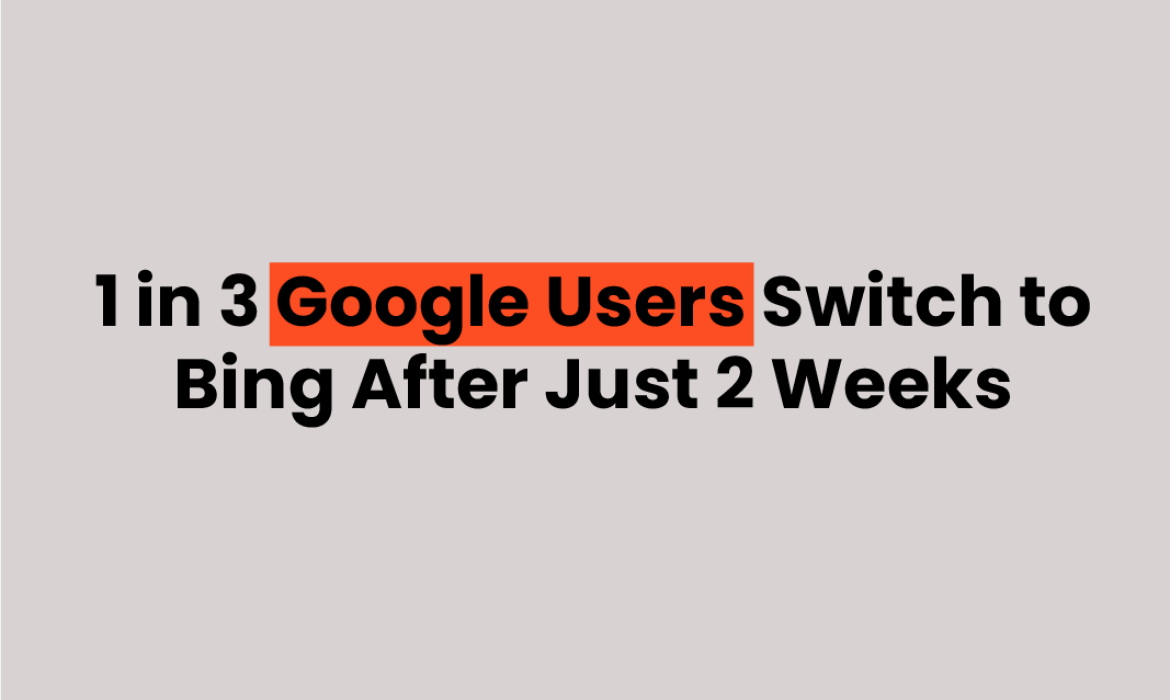New research shows that many users stick with Bing after trying it—challenging the idea that Google’s dominance is purely about quality.
Google vs. Bing: Study Finds 33% of Users Stick with Bing After Trial
A groundbreaking study has found that 33% of Google users who tried Bing for just two weeks didn’t go back. This revelation casts doubt on the belief that Google’s 90% market share is purely a result of superior quality.
Key Findings:
- A third of users who tried Bing continued using it—even without incentives
- Exposure improved user perception of Bing’s quality
- Default search settings, not just quality, drive user behavior
The research was conducted by economists from Stanford, MIT, and the University of Pennsylvania, and published by the National Bureau of Economic Research.
Is Google Winning by Quality—or Convenience?
The study examined 2,354 desktop users to understand what really keeps Google on top. Researchers explored several factors:
- Product quality
- Brand misconceptions
- Inertia due to default settings
- Switching friction
- Lack of attention
- Google’s data advantage
Google maintains that competition is “only a click away,” but the data paints a more complex picture.
“Our results suggest that perceptions about Bing improve significantly after actual usage.” – Study Authors
“Try Before You Dismiss”: Bing’s Perception Gets a Boost with Exposure
Perhaps the most eye-opening insight: one-third of participants kept using Bing after a two-week paid trial—even after payments ended.
User feedback included:
- 64% said Bing was better than expected
- 59% said they got used to it
- Perceptions of Bing’s quality increased by 0.6 standard deviations
This shift narrowed the perception gap between Google and Bing by about one-third, showing that Bing’s issue may be more about lack of exposure than poor performance.
Default Settings Still Play a Huge Role
Even when users were asked to choose their preferred search engine (without a trial), Bing’s usage rose by just 1.1 percentage points.
Why?
Because default settings prevent exploration. Users rarely switch on their own—not necessarily because they love Google, but because they don’t try alternatives.
The study explains:
“Some participants may continue to prefer Google but not switch back due to persistent inattention.”
Google’s Data Advantage Isn’t a Game-Changer for Bing
Could Microsoft close the gap by gaining access to Google’s user data? Apparently not. The research estimates that Bing’s click-through rate would only improve from 23.5% to 24.8%, even with Google-level data.
This further supports the idea that perceived quality and user familiarity, not technical inferiority, keep Bing in second place.
Choice Screens Alone Won’t Break Google’s Grip
Even regulatory efforts—like the EU’s mandatory search engine choice screens—may not significantly disrupt Google’s lead. The study predicts:
“Choice screens would only increase Bing’s market share by 1.3 percentage points.”
Real impact, the researchers argue, would come from encouraging actual hands-on usage of alternative search engines.
How the Study Worked: Real Behavior, Not Just Surveys
Unlike typical opinion polls, this study used a browser extension to track real search behavior over time. Users were divided into four groups:
- Control Group – No changes
- Active Choice Group – Asked to pick a search engine
- Default Change Group – Paid to switch to Bing for two days
- Switch Bonus Group – Paid to use Bing for two full weeks
The most dramatic change came from the fourth group, where the “experience effect” proved powerful.
What This Means for Search Marketers and Regulators
This study provides valuable insights for regulators, antitrust authorities, and digital marketers alike:
- Google’s dominance relies heavily on defaults and familiarity
- Users are open to alternatives when given the chance to explore
- Encouraging trial usage may be more effective than legal mandates
“Search engines are experience goods. Remedies that induce learning can improve market efficiency.” – Study Conclusion
Final Takeaway: Google’s Lead May Be More Fragile Than It Looks
While Google still dominates the search engine market, this study suggests that true competition can emerge—but only if users are nudged into trying something new. Bing, DuckDuckGo, and other alternatives could gain traction if barriers to trial are reduced.
For now, Google remains the default—but the tide may shift as more users discover they have real choices.



